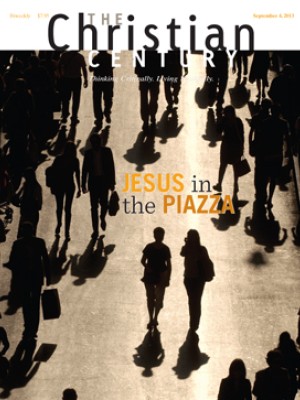Book fare
I always wrote down anything I was going to deliver orally and still do, including sermons. This is because I think and convey ideas more clearly at a desk with a pen in hand than I do on my feet in front of a group of listeners. That may not be true for everyone, but it is for me. That’s why books about writing and reading occupy much of my time.
My favorite writing books are Anne Lamott’s Bird by Bird and Annie Dillard’s The Writing Life. Because writing has been important to me, I love Dillard’s book and keep at hand two vignettes from it. She wrote, “Appealing workplaces are to be avoided. One wants a room with no view, so imagination can meet memory in the dark.” I have also appreciated her advice about using ideas that are hot and ready to be expressed:
Read our latest issue or browse back issues.
One of the things I know about writing is this: Spend it all, shoot it, play it, lose it all, right away, every time. Do not hoard what seems good for a later time in the book or for another book [or sermon]; give it, give it all, give it now . . . Something more will arise for later, something better. These things fill from behind, from beneath, like well water.
I wrote once that books read in the summer are like jars of canned tomatoes and beans on your mother’s cellar shelves—they get you through the long winter of sermonizing. Now I’m retired and have the luxury of reading what I want.
So this summer at the beach I read Jeff Shaara’s A Blaze of Glory: A Novel of the Battle of Shiloh, and was staggered once again by the raw brutality and devastation of the Civil War. I also read Hilary Mantel’s Bring up the Bodies, a follow-up novel to her award-winning Wolf Hall, about Henry VIII and his right-hand man, Thomas Cromwell. (“Bring up the bodies” is the order that was given when it was time to bring prisoners from the Tower of London to the scaffold.)
I read Benediction, the last book in Kent Haruf’s trilogy (the others are Plainsong and Eventide). Haruf’s characters are compelling and human. Haruf had me in the first chapter when Dad Lewis, a Colorado farmer, who has just learned that he is terminally ill, is sitting on his front porch in the early evening. His wife asks if there is anything she can do. He requests a cold beer, looks at the bottle and says, “I might get me some kind of better grade of beer before I go. A guy I was talking to said something about Belgian beer. Maybe I’ll try some of that. If I can get it around here.”
I recently discovered the work of popular Franciscan priest Richard Rohr. I liked A Lever and Place to Stand: The Contemplative Stance, the Active Prayer. Finally, I was intrigued by Kenneth L. Vaux’s The Ministry of Vincent Van Gogh in Religion and Art. I was absorbed in Vaux’s thesis—that Van Gogh’s art grew out of his deeply spiritual longing and failed attempt to become a clergyman. The book is expertly researched and full of information about Van Gogh’s life, friends and painting.
In a letter Van Gogh writes: “Everything in men and in their works that is truly good, and beautiful with an inner moral, spiritual and sublime beauty, I think that that comes from God. . . . I’m always inclined to believe that the best way of knowing God is to love a great deal. . . . Someone, for example, will love Rembrandt . . . that man will know there is a God.”
Then a friend called to tell me about a new book on reading. “Stop what you are doing. Go to the bookstore and buy The End of Your Life Book Club, by Will Schwalbe.” I’m glad I took her advice. When Schwalbe’s mother, a lifelong reader, was dying, she and her son spent long hours in hospital waiting rooms. Realizing that they usually talked about books and reading, they founded a two-member book club and read together and talked about what they were reading for the rest of her life. It is a gentle book that booklovers will appreciate.







